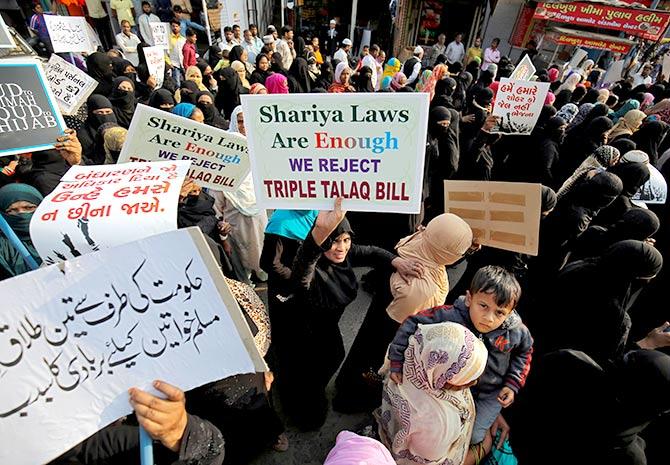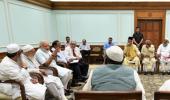The All India Muslim Personal Law Board (AIMPLB) moved the Supreme Court on Monday seeking impleadment in petitions challenging constitutional validity of polygamy and 'nikah halala' practised among Muslims.

The application has been filed to oppose a batch of petitions on which the apex court had in 2018 issued notices to the Centre and other stakeholders while referring the matter to a 5-judge Constitution bench.
While polygamy allows a Muslim man to have four wives, 'nikah halala' stipulates that a Muslim woman, who wants to remarry her husband after divorce, has to first marry another man and get divorce from him after consummating the marriage.
The two issues had arisen when the apex court was dealing with the practice of triple talaq.
By a 3:2 verdict, a five-judge Constitution bench on August 22, 2017 had banned the 1,400 year-old practice among Sunni Muslims saying it was against the basic tenets of the Holy Quran and violated the Islamic law Shariat.
The top court had then made it clear that it would deal separately with the issues of polygamy and nikah halala at a later stage.
The AIMPLB plea on Monday said the apex court has already dealt with the issue of these practices in its verdict of 1997 in which it had declined to entertain the petitions.
"That personal laws do not derive their validity on the ground that they have been passed or made by a legislature or by other competent authority. The fundamental source of personal laws are their respective scriptural texts," the AIMPLB plea said.
"The Mohammedan law is founded essentially on the holy Quran and the Hadith of the Prophet Mohammed and thus it can't fall within purview of expression 'laws in force' as mentioned in Article 13 of the Constitution and hence its validity cannot be tested," it said.
The plea of Personal Law Board said that Article 44 of the Constitution stipulates that the State shall endeavour to secure for the citizens a uniform civil code throughout the territory of India.
"It is submitted that Article 44, which envisages a Uniform Civil Code is only a directive principle of state policy and is not enforceable," it said.
The Article recognizes the existence of different code applicable to different religions in matters of personal law and permits their continuance until the state succeeds in its endeavour to secure for all citizens a Uniform Civil Code (UCC), it said.
"That these very same practices were challenged in 1997 verdict in Ahmedabad Women Action Group versus Union of India, in which this court had itself declined to entertain the matters by taking the view that these issues were to be dealt with by the legislature and not judiciary," it said, adding that rights of Muslim Women are already protected by virtue of Muslim Women (Protection of Rights on Divorce) Act of 1986.
Questioning the locus standi of Bharatiya Janata Party leader and advocate Ashwini Kumar Upadhaya for filing a PIL challenging polygamy and 'nikah halala' practices, the AIMPLB said that it is of the view that ordinarily, any person other than a member of a religious denomination should not be allowed to question the faith of another religious denomination.
"A member of a religious denomination belonging to that faith, in the event of any violation of their fundamental rights, only to the extent of a threat to life and liberty, may be permitted to seek the protection of the court and determine the issues of faith arising therefrom," the petition said.
In March 2018, the apex court had issued notices to ministries of Law and Justice and Minority Affairs as well as the National Commission of Women (NCW) after taking note of the plea of Delhi-based woman Nafisa Khan challenging the two practices, and said the issues raised in a batch of petitions, including by Upadhaya, will be taken up by a 5-judge Constitution bench.
The apex court had also considered the submission that an earlier 5-judge Constitution bench, in its 2017 verdict, had kept open these issues while quashing triple talaq.
On March 14, 2018 Khan had moved the apex court saying that by virtue of Muslim Personal Law, section 494 of Indian Penal Code (marrying again during lifetime of husband or wife) was rendered inapplicable to this community and no married Muslim woman has the avenue of filing a complaint against her husband for the offence of bigamy.
She sought that Dissolution of Muslim Marriages Act, 1939 be declared unconstitutional and violative of Articles 14, 15, 21 and 25 (freedom of conscience and free profession, practice and propagation of religion) of the Constitution in so far as it fails to secure for Indian Muslim women the protection from bigamy which has been statutorily secured for women in India belonging to other religions.
The petitioner, who herself claimed to be a victim of such practices, had alleged that her husband and his family used to torture her for dowry and she was ousted from the matrimonial home twice.
She had also alleged that her husband had married another woman without taking any legal divorce from her and the police had refused to lodge FIR under section 494 and 498A (husband or relative of husband of a woman subjecting her to cruelty) of the IPC stating that polygamy was permitted under the Sharia.
The top court had also allowed Muslim Women Resistance Committee, Kolkata to file an application for impleadment as a party in the hearing.










